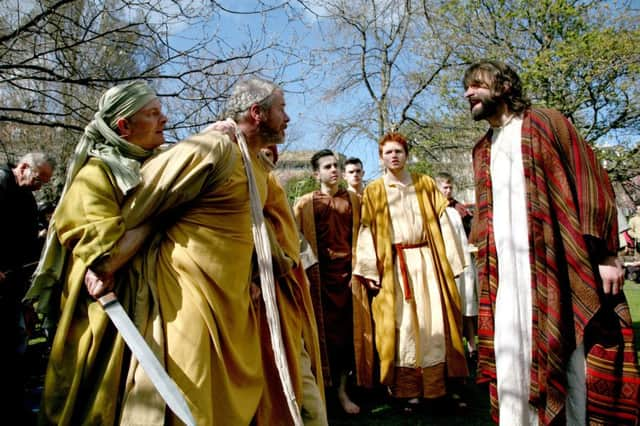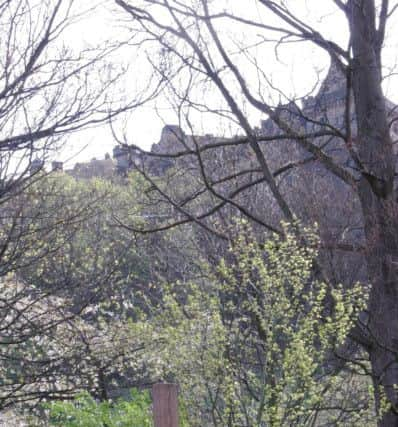Edinburgh Easter Play gives voice to rarely heard Bible figures


This year’s play is a completely new version, devised by the actors themselves and director Suzanne Lofthus. The actors – a cast of community performers, supported by a professional actor, Duncan Rennie, in the role of Jesus – worked on improvising scenes and writing parts for their own characters.
They have created a version of the story which is fresh and sometimes surprising, bringing to the forefront voices who are rarely heard, such as Judas Iscariot and Mary Magdalene, and adding some completely new characters, such as Anna, the mother of Judas.
Advertisement
Hide AdSuzanne Lofthus, who has been directing Passion Plays in Edinburgh since 2005, said: “I was interested in some of the characters in the story whose voices are not normally heard. We’ve been thinking outside the box, taking inspiration from artists, including Leonardo da Vinci and Bill Viola, and landmarks pieces of theatre like Les Miserables.


“The story of Easter is one of the greatest stories in the world and there are lots of ways to tell it. You might think you’ve seen it before, but you haven’t seen it done like this.”
Three members of the cast talk about their experiences making this year’s Easter Play.
Sally North
Retired occupational therapist from Broxburn


Plays Anna, Judas’ mother
When we were working on last year’s Easter Play, Suzanne (Lofthus, the director) encouraged us to make up a back story for our characters. I was playing a woman in the crowd, and decided I was Judas’ mother. He must have had a mother, after all, although she isn’t in the Bible.
I started to write a monologue for her and the whole thing just flowed. I rather sheepishly showed it to Suzanne, and that was one of the things which prompted the decision to do this year’s play as a piece of devised theatre.
The Easter story doesn’t change, but we have explored the stories of a few of the people who might have been there who don’t appear in the official version. If people know the story, we hope it might make them stop and think to hear it told in a different way.
Advertisement
Hide AdAnna comes up to Jerusalem for Passover, one of the group of women – mothers, wives and girlfriends – who are watching everything from the fringes. When she hears Jesus has been taken to be crucified and it’s all because Judas betrayed him, she is confused, she doesn’t know what to make of it.
After the crucifixion, she meets Mary, the mother of Jesus. By this time, we have both lost our sons (Judas has hanged himself). The story of two mothers who come together in grief is something that might touch people.
Advertisement
Hide AdI’ve been involved in the Easter Play since the very first one in Princes Street Gardens in 2005. We’ve done all kinds of different versions, modern and traditional. It all helps to look at the story anew, make it relevant for today.
One year, one of the other actors said she’d written a play for the Fringe and asked if I would do a non-speaking part. Now I’ve appeared in all sorts of things on the Fringe and other shows with Edinburgh People’s Theatre, all because of the Easter Play. Of all the things I thought I might do when I retired, amateur drama didn’t come into it at all, and now it’s taken over.
Benjamin Ferguson
Actor from Kirkcaldy
Plays Peter
I studied acting and performance at Carnegie College, Dunfermline, from 2010 until 2013, and since then I’ve been working on plays, films, whatever acting work I can get my hands on. I heard about the Easter Play through Facebook and got in touch with Suzanne who suggested I come along to a rehearsal. My first year was 2014 when we did the Edinburgh Passion (a new version by Rob Drummond set in contemporary Scotland).
I really like working with Suzanne as a director and with the rest of the cast. Doing new versions of the story keeps it fresh and interesting and gives us new challenges as actors. This year was challenging at times. We worked everything out at rehearsals through improvising. We all made suggestions – at one point, I started trying out something, following Jesus, and Suzanne said, ‘Look at what Ben’s doing, that could work’, so everyone tried it.
I think of Peter as one of the first to start following Jesus, his right hand man. He is very loyal. I wrote a monologue for him, that really helped me get into the mindset. He was a fisherman, a bit lost in life until he heard Jesus speak, then decided to befriend him and follow him. He believes so much in this man and what he’s doing he will fight anybody who dares to say otherwise.
When we started rehearsals on this play, I was also working on another play, Bones, Bogles and Coronets, which was performed in Dunfermline Abbey on 10 March, commemorating 200 years since the discovery of the grave of Robert the Bruce. It was interesting doing research on him, but doing two plays was a bit frantic at times. I’m happy to be able to concentrate fully on the Easter Play now.
Trevor Roach
Financial services manager from Edinburgh
Plays Judas
Advertisement
Hide AdWhen I was asked to play Judas, I thought, ‘What do I know about him?’ Pretty much what everyone knows: that he got 30 pieces of silver for betraying Jesus with a kiss.
He spent two years with Jesus, gave up everything, as all the disciples did. I kept wondering what might have attracted him to that. Why did he give up two years of his life to follow Jesus then betray him? I thought, what if he had told his parents about Jesus and they reacted badly – his father called him a heretic and disinherited him? That could have driven him to join Jesus.
Advertisement
Hide AdThere were a lot of freedom fighters around at that time, fighting against the Roman occupation. I imagined Judas was more interested in peaceful rebellion, what we’d now call civil disobedience. He saw Jesus as someone who could galvanise the people to rise up against the Romans, to drive these gentiles out of their land.
Then he realises that isn’t happening – Jesus is about forgiveness and reconciliation. That drove him to betray him, not because he’d lost faith, but because he thought this was something which would make Jesus see the Romans for what they are. He didn’t think he’d be crucified, just detained, perhaps beaten and released.
Usually, we have a script and it’s about bringing that script to life. What we did this year was a bit like being a kid again, becoming a character and playing make-believe, but doing it as if it was real. It was interesting – good fun but hard work.
I’d never done any acting when I saw a poster at work looking for people to take part in a Nativity play about six years ago. I thought I might go along, get a non-speaking part and have some fun. I did have fun, but I ended up playing the part of Herod.
After that, I started doing the Easter Play. I love the fact that we entertain people with this serious message. Some people will come and see a spectacle, others will take away something which will make them think.
The Edinburgh Easter Play will be on Saturday 31 March at 2pm in Princes Street Gardens West. The performance is free and unticketed. For more information, see www.easterplay.org